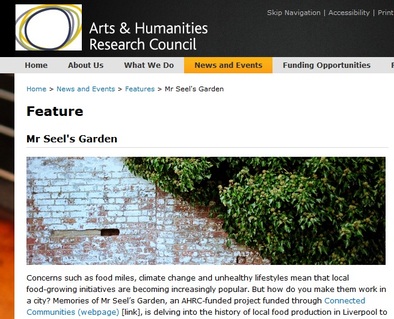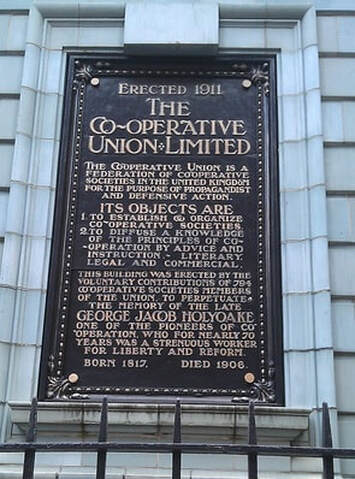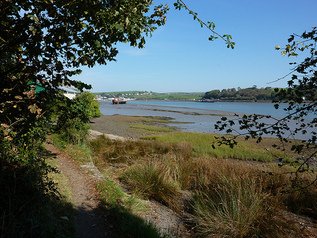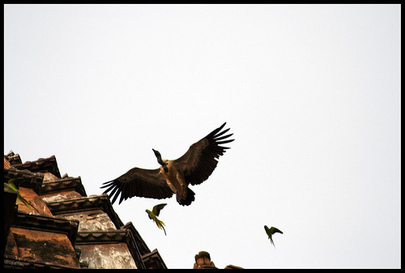 Caroline Roberts was in touch a little while ago to interview some of the participants of the Mr Seel project for a feature commissioned by the AHRC. We've just seen that this is now available on the AHRC website. Go here to read in full. I recently completed the final report for the Memories of Mr Seel's Garden Project. This will be published as part of the Connected Communities Discussion Paper series. You can download the report below.
Originally published on the Sustaining Time blog, part of an AHRC funded project which asks the question: What would be the time of a sustainable economy? The Sustaining Time project is funded under the AHRC's Care for the Future theme. In keeping with its aim of 'thinking forward through the past', one strand of our project will scope out the potential of archive resources to provide material for understanding how alternative economic models might challenge dominant approaches to time. The team will be visiting four archives over the course of the project. This post by Alex Buchanan is the first in a series that looks at how we've approached the task of finding time in the archives.  Our first archive visit was to the National Co-operative Archive. This was a great place to start our research, in part because of the way the archivists have helped to make their resources accessible. As I'll explain in this post, the level of detail used in the archive descriptions enabled us easily to identify items which might be of interest and to order them from storage before we arrived. This won't be the case at other archives we visit, so I'm going to use this post to explore how archivists' work can support research, whilst recognizing that such efforts aren't always possible. Since the nature of our research is so specific, i.e. finding out how those experimenting with economic systems might be thinking about time, we will have to put in some additional effort to understanding both the domain and the archives we use in order to get the most out of these resources. There are 6 ways of searching the Co-op archive online, including an image search, which we did not use. In line with most users' preferences, the default option is a simple free text search. We used this to identify the majority of the items we used, by using keywords including: time, hour/s, work, working, clock/s, future, nature, change, evolution, progress, history, environment, flood/s, earthquake/s, disaster/s. However, as our list of search terms suggests, the disadvantage of this method is that even changing the word from singular to plural brings a different list of results, because the search engine simply looks for exact matches anywhere in a description. This creates a number of problems when trying to research time in the archives. A good example was our search for 'clocks'. Anyone looking for clocks may also be interested in watches, but because the word has another, more common meaning this can confuse the results. In our case, all the item descriptions that included the word 'watch' were for images involving onlookers. This means that it is possible that the Co-op archives include information about pocket and wrist watches (these were often retirement gifts for long serving employees in many businesses, for example), but unless the archivist has included the word in the item description it will not be accessible via a keyword search. One of the ways archivists try to deal with this and other problems associated with keyword searching is to 'index' archives - that is to say, to associate the description with a number of 'authority terms' which the cataloguer decides have particular relevance for the unit being described. At the Co-op archive there are indexes for names (of people and organizations), subjects and places. Authority terms are created as a separate exercise and can involve considerable research, to ensure that, for example (and, not, as far as I am aware, featuring in the Co-op Archive), Robert Smith, equestrian, son of Harvey Smith, is not confused with Robert Smith, musician, lead singer in The Cure. When used consistently, indexes can often be the most efficient and effective means of searching - but they are labour intensive to create. Of the three types of index, subject indexes are perhaps the most problematic for archives. From the point of view of an archivist, archives are not in the first instance information resources because - unlike books - this is not the purpose for which most records were created. Most records are created as evidence - to provide a persistent representation of a time-delimited event. Minutes from meetings provide a good example of this. As the influential archival writer Sir Hilary Jenkinson (1882-1961) declared, they 'were not drawn up in the interest of, or for the information, of posterity'. The American archival theorist T.R. Schellenberg modified this perspective, by suggesting that archives have two sets of values: primary values for their creators and secondary values for other users, which come into play in particular when records, created for current purposes, cross the 'archival threshold' and then may be used by a wide variety of users for a wide variety of purposes. Archivists want to open the records in their custody to the widest variety of users and uses. Subject indexing is intended to assist with this but archivists cannot predict all the possible topics future researchers may want to investigate. Trying to represent the subject matter of a document from the perspective of its creator/s follows archival theory's traditional emphasis on provenance (discussed further below) and thus appears theoretically straightforward, although it inevitably involves difficult decisions in practice, as anyone who has ever tried to describe a photograph without knowing what the photographer was trying to capture will recognize. Extending this indexing to include possible research topics is fraught with difficulties and is thus rarely attempted: a more common approach is the 'Subject Guide', whereby an archivist gathers together potential resources for a researcher interested in a particular subject area. However, when embarking on this research, we were aware that the elusive nature of time and temporal awareness was one of the difficulties we would have to overcome (which will be explored in our 'Methods Festival' in June) - there are no useful archive guides on temporal research to assist us. Archivists' descriptions try to represent the context of creation of the records - this is what is known as 'provenance'. Whilst archives can be used to support an almost infinite variety of research topics, which will inevitably change over time, it is generally accepted that our understanding of the people and processes that created the records in the first place are likely to remain relatively constant and that this knowledge is vital for interpreting the records' historical meaning. This means that archivists try to maintain the original order of the records, and list them according to their creators. Thus at the Co-operative Archive, all the records of the Crumpsall Biscuit Works are described as a single group. They are, of course, not all the records created - the vast majority have not survived, but enough remained for us to get a sense of the importance the Co-op movement accorded both to worker welfare and to production efficiency in this model factory. In an archive where descriptions are less full than at the Co-op, the only way we may be able to identify records relevant to our research will be by identifying the types of organizations and the historical circumstances which might produce records of potential interest. Again, by starting with an archive with a very detailed catalogue, we have started to build up a picture of what sorts of series of records are likely to be of particular significance to our research. In a later post, I'll explore how 'Time' is represented in other forms of resource discovery, such as library catalogues. Alex Buchanan Originally published on the More-than-Human Participatory Research blog, an AHRC funded project exploring the possibility of extending participatory research techniques to non-humans.  I've already written about some of the thinking we've been doing as part of the process of planning our workshops. It's proving to be a fascinating process in and of itself. Last week I had a chat with Antony Lyons, who is working with Owain Jones to organise our fourth workshop "In Conversation With Water". This workshop will be taking place in early October and our research partner in this case will be the Torridge River in Devon. This project is all about pushing the boundaries of 'polite' research conversations to see who or what might be included. So we're really excited to be involved in a process where we need to think about how to include water as an active participant in research. In a way, this sounds like the craziest of all our ventures, but in my initial discussions with Antony, when we were preparing the original bid, I asked him whether it might be possible to take account of the capacities, qualities and agency of water in the research process. His answer was "of course". In a sense this is already what water management strategies are required to do. A water engineer is already expected to know these things as part of their job. This made me wonder whether it might be possible to say that water actually already has more of a 'voice' in the research process, than dogs, for example, where full knowledge of their capacities and qualities is not a pre-requisite for working with them. Even so, I remembered from my former life as a graduate at Mouchel, working on waste water projects, that the emphasis when working with water was more on controlling it than supporting its ability to remake places as it wanted to (for example through the use of Sustainable Urban Drainage Systems). In discussing how Antony might organise the workshop two main issues came up. First how were we going to actually have a conversation with water? The first day was set aside for this, and once I reassured Antony that everyone really was up for some adventurous encounters, he suggested that we might go out on kayaks, go snorkelling or explore other ways to get out onto the estuary and interact with the river. The second question was what would our focus be? Having a particular issue to frame our readings, thought processes and planning would hopefully help us drill down into some specific issues rather than only talking about water in general. The issue of control had been an important one in our reflections on the In Conversation with Dogs workshop and Antony suggested the flood control would be an obvious topic that might help us combine our observations across those two workshops. We could then explore how methods of flood control affect the 'aliveness' of the river. We could also draw on the participatory research already done with communities affected by flooding such as the Knowledge Controversies project led by Sarah Whatmore. Antony will be writing a post for the blog to help us think through this further, and we'll also be having discussions with Andrew Bell from the North Devon Biosphere reserve who will be helping to lead the first day. So more thinking and planning to do, but it's shaping up to be a very exciting workshop. I was very pleased to be invited to speak at a recent event on Qualitative Longitudinal Research methods as part of the NCRM funded research network: New frontiers in qualitative longitudinal methods: definition, design and display. This was the third event in the series and focused on exploring how duration and seriality are conceptualised in QLR. I gave a paper on ways these concepts are explored in philosophy with particular focus on Newton, Aristotle, Heidegger, Anzaldua and Hobbles Danayarri which you can view below. Originally published on the More-than-Human Participatory Research blog, an AHRC funded project exploring the possibility of extending participatory research techniques to non-humans.  This project takes place in a context of mass species extinction, extensive habit loss, climate change, and resource depletion. At its heart is the conviction that, while dominant research paradigms have undoubtedly given rise to improvements in a range of areas, they have nonetheless failed to address how our changing societies might remain within sustainable limits. One concrete example of the effects of failing to consider more-than-human communities within research is the drastic decline of vultures in East Asia, where over 99% of the population have died from acute reactions to diclofenac, an anti-inflammatory drug given to cattle. Over and above the consequences for the vultures themselves, the increasing amounts of carrion available, (which was previously eaten by the vultures), has led to an exploding feral dog population, which in turn has led to tens of thousands of rabies cases in humans, as well as increases in other diseases. There have also been cultural losses for Zoroastrian communities who have had to find alternative funeral methods. This cascade of effects, which has very real consequences for humans, is partly due to inadequate research methods around drug testing that do not take broader contexts into account (van Dooren, 2010). What this suggests is that the impacts of transforming research practices so that they operate within a paradigm of more-than- human communities are potentially immense. However, shifting conventional research paradigms, many of which remain embedded within Enlightenment philosophies of self-aware humans in a machine-like world, is not a task to be taken at all lightly. Thus while we would like to situate our project within this broader context, we have more modest hopes for our work. Traditionally, concepts of community have been tightly bound to ideals of shared communication. The vision of the localised, face-to-face community and the emphasis on the need for shared languages and cultures, as well as the exercise of public reason (e.g. Habermas), remains influential even as it has been widely challenged. In this context, the move towards the co-production and co-design of research (e.g. Ostrom, 1996) is particularly interesting, since even while much of this research is aimed at strengthening local communities, at its heart is an account of knowledge as partial and situated (Haraway 1988). That is, rather than taking a universalist approach to knowledge, and knowledge generation, it is explicit about the difficulties of communication and the incompleteness of any knowledge system. As a result, the co-production agenda raises a range of fundamental philosophical questions about what it means to generate knowledge, even while it insists on the need to engage with a wide variety of stakeholders in the interest of stronger and more ethical research processes. Inspired by a variety of feminist epistemologies, as well as emancipatory movements from South America and Africa (e.g. Freire 1970 [PDF]), the central components of the co-production agenda have been the desire to support the inclusion of marginalised voices in the research process, to make research accountable to those it affects, and, in the process, to transform the practice of research and knowledge production. To date, discussions of co-production have taken place in a range of areas including public service provision (Verschuere, 2012), health services (Gillard, 2010), management and organisational research (Antonacopoulou, 2010; Orr, 2009), as well as broader debates about science, policy and the public realm (Nowotny, 2001). However, in our current context, where the failure of the enlightenment project to produce knowledges that support sustainable ways of life has become clearly apparent, there are strong incentives to extend this agenda by thinking through what, and who, research might still need to take into account. Intriguingly, one of the foremost current proponents of participatory research - Peter Reason – has explicitly argued that the ethical and political imperatives implicit within the co-production paradigm need to be extended to non-humans (Reason, 2005). Claiming that we need to re-conceive ourselves as embedded within biotic systems, Reason characterises the notion of the more-than-human as an emergent edge within participatory research. Like other writers on co-production within sustainability research (Maclean, 2009; Pohl, et.al. 2010), he notes that non-humans are both marginalised from, and affected by, research processes. The need to more explicitly engage with the problem of how to place non-humans at the heart of the research process has also been noted by feminist biologist Lynda Birke in relation to Human-Animal Studies (Birke, 2012, 152). Even so, the work of exploring how co-production might be redesigned to take non-human participants into account is still to be undertaken. Despite this, there is much work to suggest that taking the more-than-human into account can produce broader understandings of both ‘community’ and ‘research’ that are better able to account for the changing nature of communities in our current context. Bruno Latour’s notion of a Parliament of Things (Latour, 1993), and Donna Haraway’s account of companion species (Haraway, 2008) already provide important pathways into thinking through these issues. More recently, Nigel Clark’s account (2010) of the role of dynamic geological processes in social life provides an example of how to extend the more-than-human community beyond animate life. Work utilising methods such as multi-species ethnography has further shown the importance of attending to the perspectives of non-humans in understanding technology design (Mancini, 2012), tourist communities (Fuentes, 2010), indigenous activism (de la Cadena, 2010) and field research (Candea, 2010). Connecting research on co-production and ‘the more than human’ thus has the potential to extent both literatures while also contributing to more nuanced understandings of ethics, power and voice in the research process. References Antonacopoulou, E. P. (2010). "Beyond co-production: practice-relevant scholarship as a foundation for delivering impact through powerful ideas." Public Money & Management 30(4): 219-226. Birke, L. (2012). "Unnamed Others: How Can Thinking about "Animals" Matter to Feminist Theorizing?" NORA - Nordic Journal of Feminist and Gender Research 20(2): 148-157. de la Cadena, M. (2010). "Indigenous Cosmopolitics in the Andes: Conceptual Reflections beyond “Politics”." Cultural Anthropology 25(2): 334-370. Candea, M. (2010). ""I fell in love with Carlos the Meerkat": engagement and detachment in human-animal relations." American Ethnologist 37(2): 241-258. Clark, N. (2010). Inhuman Nature: Sociable Life on a Dynamic Planet London, Sage. van Dooren, T. (2010). "Pain of Extinction: The Death of a Vulture." Cultural Studies Review 16(2): 271-289. Freire, P. (1970). Pedagogy of the Oppressed. New York, Continuum. Fuentes, A. (2010). "Naturalcultural encounters in Bali: Monkeys, Temples, Tourists, and Ethnoprimatology." Cultural Anthropology 25(4): 600-624 Gillard, S., K. Turner, et al. (2010). "“Staying native”: coproduction in mental health services research." International Journal of Public Sector Management 23(6): 567 - 577 Haraway, D. (1988). "Situated Knowledges: The Science Question in Feminism and the Privilege of Partial Perspective." Feminist Studies 14(3): 575-599. Haraway, D. (2008). When Species Meet. Minneapolis, University of Minnesota Press. Latour, B. (1993). We have never been modern. Cambridge, Mass, Harvard University Press. Maclean, K. and L. Cullen (2009). "Research methodologies for the co-production of knowledge for environmental management in Australia." Journal of the Royal Society of New Zealand 39(4): 205-208. Mancini, C., J. v. d. Linden, et al. (2012). Exploring Interspecies Sensemaking: Dog Tracking Semiotics and Multispecies Ethnography. Ubicomp, Pittsburgh, USA. Nowotny, H., P. Scott, et al. (2001). Rethinking Science: Knowledge and the Public in an age of uncertainty. Cambridge, Polity Press. Orr, K. and M. Bennett (2009). "Reflexivity in the co-production of academic-practitioner research." Qualitative Research in Organizations and Management: An International Journal 4(1): 85 - 102. Ostrom, E. (1996). "Crossing the great divide: Coproduction, synergy, and development." World Development 24(6): 1073-1087. Pohl, C., S. Rist, et al. (2010). "Researchers' roles in knowledge co-production: experience from sustainability research in Kenya, Switzerland, Bolivia and Nepal." Science and Public Policy 37(4): 267-281. Reason, P. (2005). "Living as Part of the Whole: The Implications of Participation." Journal of Curriculum and Pedagogy 2(2): 35-41. Verschuere, B., T. Brandsen, et al. (2012). "Co-production: The State of the Art in Research and the Future Agenda." Voluntas: International Journal of Voluntary and Nonprofit Organizations 23(4): 1083-1101. Originally published on the Sustaining Time blog, part of an AHRC funded project which asks the question: What would be the time of a sustainable economy? This post is written by Chris Warburton-Brown  Rush Hour by Tuan Minh Pham Rush Hour by Tuan Minh Pham Chris Warburton-Brown is the Research Coordinator at The Permaculture Association and in this post he explains why Permaculture UK got involved in the Sustaining Time project. Wasting time, spending time, giving you my time, running out of time, investing time, in your own time... all of these common phrases suggest that we see time as a finite, own-able resource like any other. And it would be fair to say that most of us feel that resource is often in short supply in our lives as we try to reconcile the demands of work, family and leisure. But unlike other finite resources that are in short supply in post-industrial society, most of us in the environmental movement have not yet formulated much response to the shortage of time we often experience. This is all the more strange when we realise that our relationship to time as a finite resource is intimately linked to our relationship to other finite resources; oil to fuel rapid transport, electricity to power labour saving (i.e. time saving) domestic devices, farmland or forest lost to build road, rail and airport infrastructure. The slow food movement has made these connections and recognised that locally grown and cooked food made using craftsmen skills outside of the industrial food and transport systems will be slow food. They have set an example for us to follow. All of us with an environmental perspective on the world should be thinking hard about our relationship to time and how we might apply the same principles of conservation, use reduction and alternative approaches that we have come to take for granted with other finite resources. I hope the Sustaining Time project will help us with that thought process. |
Archives
November 2022
Categories
All
|
||||||
 RSS Feed
RSS Feed
